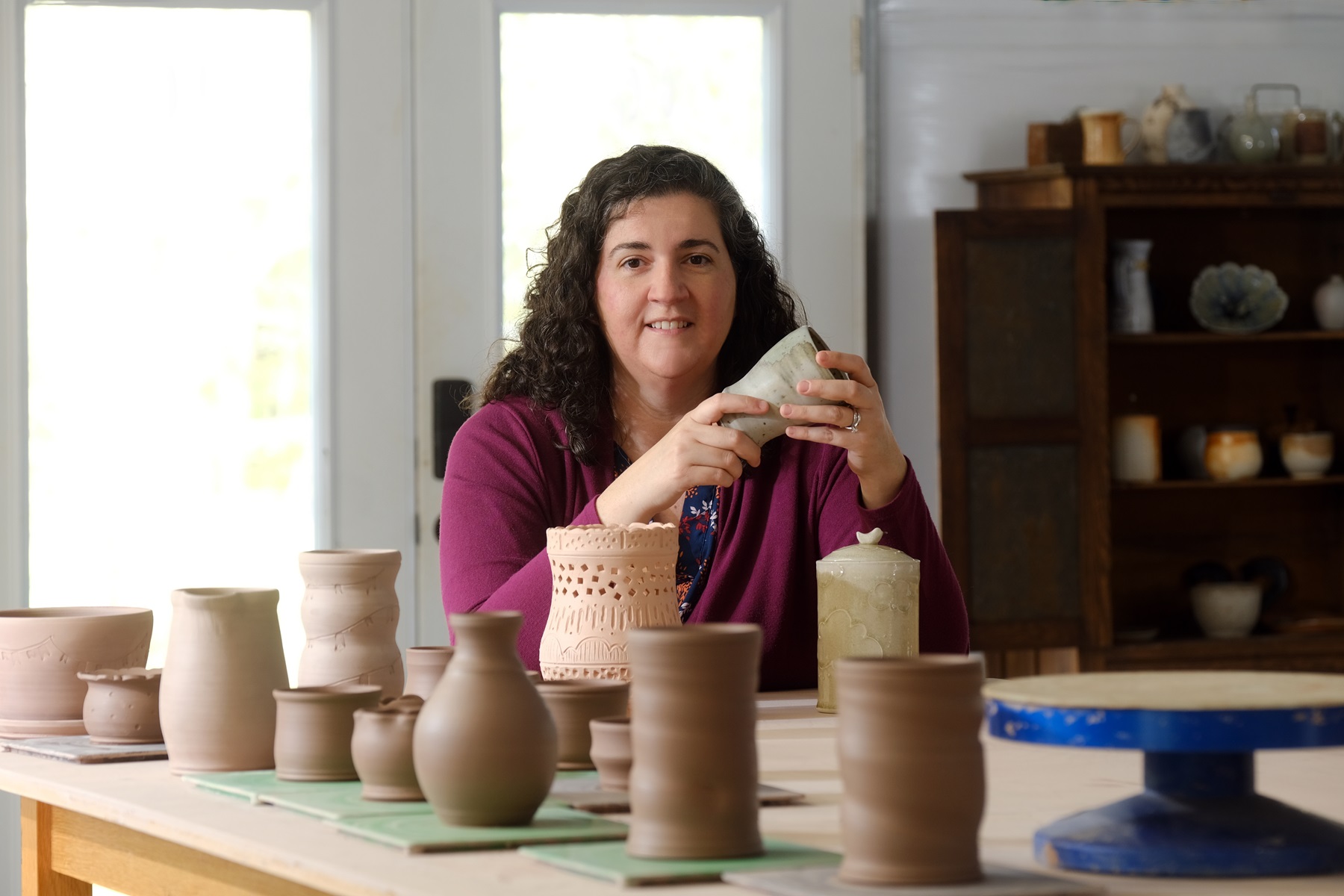ASC Fellowship Recipient Maria Frey is a Modern Potter on an Ancient Path

By Phillip Larrimore
Pottery is one of the most ancient arts of what is now the Carolinas. Some of the earliest fragments found on this continent have been unearthed here.
Perhaps this is why there is a pottery trail to this day like a long necklace from the mountains to the sea and back again, formed by the community of potters.
Maria Frey, the recipient of a $10,000 ASC Emerging Creators Fellowship, is a recent professional addition to this community.
“Receiving the grant,” she said, “is a milestone in my life as an artist. ASC has legitimized me and (has given) me the confidence to launch a sustainable career.”
This caps a long process of self-realization which took place over a period of 20 years.
Frey, who has a bachelor’s degree in graphic design, specialized in web design and creative software. Everything was done in code in cyberspace. She’s also a wife and the mother of two boys.
“Pottery was the one and only thing that I did for myself,” she said. “It was pretty much a side hobby until the pandemic.”
Her earliest mentor was Celina Burnett, who ran a studio in South Charlotte. Burnett had always asked, “What would you do if you let it be a bigger part of your story moving forward?”
She also sold Frey her first wheel. (“Throwing a pot on the wheel is like drawing with clay,” Frey said.)
Pottery is perhaps the most tactile of all the visual arts. A painter uses a brush or palette knife, the sculptor chisels or casts, but a potter uses their hands. There is a peculiar hush to be felt in even a roomful of potters throwing on their wheels and a special suspense in firing a kiln. Timing and temperature are everything, but who can weigh fire?
Making pottery in a quantity that creates a sustainable career is demanding.
In Frey’s case, what this entails on a practical level is using her ASC Fellowship to build a 30 cubic foot soda firing kiln capable of turning two hundred clay pots into ceramic during one firing. If the temperature drops, it is accompanied by a shattering sound from within and the sight of a broken battlefield of crockery when the kiln door is opened.
The soda firing process, which is what this kiln is designed for, is comparatively new to the ancient art of pottery. The process which involves introducing sodium bicarbonate, which vaporizes in the kiln covering the silica glaze of the pots within. It replaces salt firing, which is done at higher temperatures and, therefore, consumes more energy.
The process first gained traction in the early 1970s. It’s believed that Frey’s kiln will be the first of its type in Mecklenburg County.
“It has to have an atmospheric, burning flame” as she described it, wavering on a downdraft as the kiln reaches its peak temperature of roughly 1720 Fahrenheit. “The flame is attracted to the silica as if by a magnetic pull.”
It is always a matter of chance as to what the pottery will look like.
“Who knows where the flames will wrap around?” she said. “The pots are a record of that moment in time.”
Frey said that veteran potter Ron Philbrick has been “a guiding light” on the specifics of the construction, which is due to be completed this month. Others have weighed in on the question of materials and proportion.
“The community here is very extensive. If you can’t get help from this community, then your head is stuck in it” she said.
Frey’s pottery is strong through understatement. It seems classical and almost chaste in its proportion, and original in its closeness to the origins, the sources, rather than striving after novelty.
“I want to discover what the material wants to do, not what to do with the material,” she said.
With the completion of the kiln another link will be formed on the pottery trail and a new means of production will be available to the pottery community of Mecklenburg County.
It will also contribute to continuing an ancient artform into the 21st century.
Invest in ASC
ASC is committed to equity and believes cultural programs should be accessible to all, build bridges across difference, and reflect our changing community. To achieve this, we invest your dollars in the people, organizations, programs, and ideas that move us toward a more equitable, sustainable, and innovative creative ecosystem. Please complete the giving form below to help us achieve our mission.

